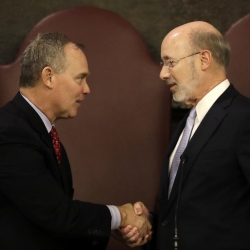
Speaker Mike Turzai (left) and Gov. Tom Wolf (right) could face on another in the 2018 governor’s race.
Pennsylvania budget talks collapsed on Wednesday, as a three-month impasse over a $2.2 billion debt placed the long-awaited 2017 online gambling legalization effort at risk. Later that same day, Pennsylvania Governor Tom Wolf (D) announced he would borrow $1 billion to pay debts, a move which could end the sense of urgency to make the deal.
That has been the pattern the past two years, when Pennsylvania’s legislators could not agree on a full budget. In 2015 and 2016, the Republican-controlled legislature passed measures to fund the state government without paying for certain programs.
All of this means an expansive online gambling bill is not passed into law.
Though details on the omnibus gaming bill needed to be hammered out, all three sides in the current budget squabble had agreed in principle to use expanded gambling to fund part of the debt.
Pennsylvania Omnibus Gambling Bill
Some plans would have generated up to $700 million-a-year from expanded gambling. Other plans would have generated only $100 million to $200 million, but each plan allowed for legalized, licensed, and regulated online poker, online casinos, and daily fantasy sports.
Throughout much of the summer, House Speaker Mike Turzai (R) wanted a minimal usage of gambling to pay for government expenditures, though he once backed a plan to place 40,000 video gambling terminals in taverns throughout the state. Pennsylvania’s land-based casino industry opposed VGTs, so that plan was scrapped (at least for now).
The Senate bills called for several new types of gaming, including tablet computer gambling in Pennsylvania’s international airports, along with Arnold Palmer Regional Airport near Pittsburgh. Another plan would have created 10 new satellite casinos with $7.5 million to $10 million licensing fees for the existing brick-and-mortar casino license holders. Nothing came of those plans, which also include expanded revenues from alcohol sales.
Pennsylvania’s $2.2 Billion Budget Deficit
The $2.2 billion deficit comes from $1.5 billion of unfunded debt carried over from 2016, along with about $700 million of unfunded programs in the 2017. Back in July, lawmakers passed a $32 billion budget deal, expecting to find a way to pay for the uncovered $2.2 billion deficit.
As the months have unfolded, that no longer appears certain. House Minority Leader Frank Dermody (D) emerged from the talks on Wednesday to tell reporters, “I don’t know where we are right now.”
That admission summed up the general mood among Pennsylvania lawmakers when the talks collapsed once again.
Jake Corman: “Not the Ending We Wanted”
Senate Majority Leader Jake Corman (R) expressed disappointment at the inability of all sides to come to a compromise. An hour after Gov. Wolf announced he would borrow to pay for government programs, Sen. Corman said, “It’s certainly not the ending that we wanted.”
Tom Wolf: “Dysfunctional Bomb-Throwing”
Accusing the Republican leadership of “dysfunctional bomb-throwing”, Tom Wolf said he would “do it myself” to keep the state government functioning. Wolf plans to borrow $1.25 billion to pay down the debt, while freezing $600 million that was scheduled to be paid to the state universities: Pittsburgh, Penn State, Lincoln, and Temple.
Now, the lost revenues for the state universities becomes the new reason to pass a budget bill. Whether that convinces lawmakers to compromise when credit downgrades, elementary school programs, and infrastructure cost did not is another matter. Hinting that he expected the standoff to continue for some time, Governor Wolf said, “I can do this indefinitely.”
Mike Turzia: A Stand against New Taxes
At the heart of the standoff is a debate over new taxes, whether that means raising the rate on old taxes or imposing new taxation. The Senate Republicans passed a bill earlier this year which imposed taxes on businesses tapping the Marcus shale oil reservoir. House Speaker Mike Turzai and the majority of House Republicans balked at that idea, saying that taxes on the natural oil reserves would harm a key Pennsylvania industry.
Instead, Mike Turzai wanted to borrow money against the landmark 1988 tobacco settlement. Turzai’s plans to borrow $1.5 billion was criticized by both Majority Leader Corman and Governor Wolf, who said Turzai’s plan simply kicked the debt down the road, while risking a credit downgrade. Sure enough, Moody’s S&P downgraded Pennsylvania’s credit rating last month, which makes borrowing more expensive than ever. Moody’s said it lowered the state’s credit score, because its leaders would not budget renewable revenues (taxes).
Pennsylvania Borrows at High Interest
Gov. Wolf thus solves the budget impasse by doing what he criticized Turzai for doing — borrowing the money. The only difference is the state’s credit rating already was downgraded, so the governor’s stated reason for criticizing Turzai’s plan no longer exists — for now. On the downside, borrowing the cash to fund the deficit means Pennsylvania taxpayers ultimately pay more interest on the loans.
Republicans believe their constituents put them in office to block higher taxes. Speaker Turzai is betting that his 3-year budget battle with Tom Wolf is going to paint the governor into a corner as a tax raiser. Turzai is expected to challenge Wolf in the 2018 governor’s race.
Thus, politics and personal ambitions look as if they will derail the best opportunity for online gambling legislation to happen in 2017. That is not to pick someone to blame in the budget squabble; both sides are aware of the wider political implications of the Pennsylvania budget wars. Both sides have men who want to compromise, like Senate Major Leader Jake Corman and House Minority Leader Frank Dermody.
2017 Pennsylvania Online Gambling Bill
Pennsylvania still has a better chance than California, New York, or Michigan to pass an online poker or online casino bill. That being said, it increasingly looks like the 2017 Pennsylvania online gambling bill is dead.
